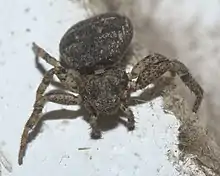Bassaniana
Bassaniana, commonly called bark crab spiders, is a widespread genus of crab spiders that was first described by Embrik Strand in 1928.[2]
| Bassaniana | |
|---|---|
 | |
| B. versicolor | |
| Scientific classification | |
| Kingdom: | Animalia |
| Phylum: | Arthropoda |
| Subphylum: | Chelicerata |
| Class: | Arachnida |
| Order: | Araneae |
| Infraorder: | Araneomorphae |
| Family: | Thomisidae |
| Genus: | Bassaniana Strand, 1928[1] |
| Type species | |
| B. versicolor (Keyserling, 1880) | |
| Species | |
|
6, see text | |
Species
As of June 2020 it contains six species, found in Europe, Asia, and North America:[1]
- Bassaniana baudueri (Simon, 1877) – Portugal, France, Germany, Austria, Slovakia, Hungary, Romania
- Bassaniana decorata (Karsch, 1879) – Russia (Far East), China, Korea, Japan
- Bassaniana floridana (Banks, 1896) – USA
- Bassaniana ora Seo, 1992 – Korea
- Bassaniana utahensis (Gertsch, 1932) – USA, Canada
- Bassaniana versicolor (Keyserling, 1880) (type) – North America
In synonymy:
- B. aemula ) = Bassaniana versicolor (Keyserling, 1880)
- B. albomaculatus (Kulczyński, 1891) = Bassaniana baudueri (Simon, 1877)
- B. japonicus (Simon, 1886) = Bassaniana decorata (Karsch, 1879)
- B. pichoni (Schenkel, 1963) = Bassaniana decorata (Karsch, 1879)
- B. typica (Kishida, 1913) = Bassaniana decorata (Karsch, 1879)
See also
References
- "Gen. Bassaniana Strand, 1928". World Spider Catalog Version 20.0. Natural History Museum Bern. 2020. doi:10.24436/2. Retrieved 2020-07-28.
- Strand, E. (1928). "Miscellanea nomenclatorica zoologica et palaeontologica, I-II". Archiv für Naturgeschichte. 92 (A8): 30–75.
Further reading
- Bowling, T. A.; Sauer, R. J. (1975). "A taxonomic revision of the crab spider genus Coriarachne (Araneida, Thomisidae) for North America north of Mexico". Journal of Arachnology. 2: 183–193.
- Gertsch, W. J. (1953). "The spider genera Xysticus, Coriarachne and Oxyptila (Thomisidae, Misumeninae) in North America". Bulletin of the American Museum of Natural History. 102: 415–482.
- Ono, H. (1988). A revisional study of the spider family Thomisidae (Arachnida, Araneae) of Japan. National Science Museum, Tokyo. p. 252.
- Gertsch, W. J. (1939). "A revision of the typical crab spiders (Misumeninae) of America north of Mexico". Bulletin of the American Museum of Natural History. 76: 277–442.
- Gertsch, W. J. (1932). "A new generic name for Coriarachne versicolor Keyserling, with new species". American Museum Novitates. 563: 1–7.
This article is issued from Wikipedia. The text is licensed under Creative Commons - Attribution - Sharealike. Additional terms may apply for the media files.